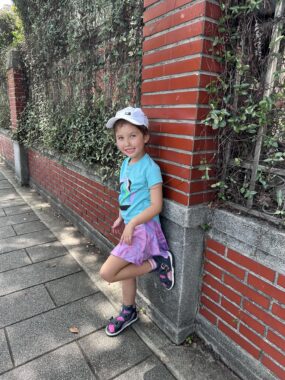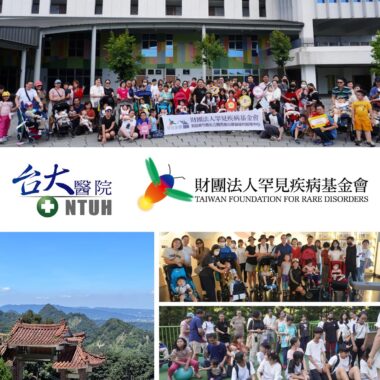Creating lasting bonds with AADC deficiency families
A meetup in Taiwan is a special gathering for this rare disease community
Written by |

Once again, my family took a summer trip to Taipei, Taiwan, to contribute data to a clinical trial. Our daughter, Rylae-Ann, is participating in a study of the long-term efficacy of a treatment for aromatic l-amino acid decarboxylase (AADC) deficiency.
Our previous trip last summer provided invaluable insight for future research. It was also an opportunity for my wife, Judy, and I to establish strong connections with other families navigating the same challenging path.

Columnist Richard E. Poulin III’s daughter, Rylae-Ann, strikes the same pose as a year ago during a recent trip to the National Taiwan University Children’s Hospital in Taipei. (Photo by Richard E. Poulin III)
Like last year, families from across the Asian region came together, with the number this year increasing to 30! To my knowledge, it might have been the largest gathering ever of AADC deficiency families.
AADC deficiency is an ultrarare disease, so only about 350 patients have been described in medical literature as having it since 1990. Thanks to improved diagnostics and awareness, more children are being diagnosed, and the reported incidence is about 1 in 1,374,129 patients globally. Due to the rarity of the disease, we only know many of the families through text messages and video calls.
A team of occupational therapists
Families attended from Hong Kong, Malaysia, the Philippines, Singapore, Taiwan, and Thailand. Traveling, especially by plane, is difficult for a child with many special needs, so we wanted to ensure the trip was worth it for these families.
Thanks to the National Taiwan University Children’s Hospital and the Taiwan Foundation for Rare Disorders, our parent meetup had an enhanced schedule. The two-day event included support from a team of occupational therapists. Each child received individual attention, and parents swooped in to assist and play with other children.
The therapists offered individualized attention to each child, tailoring their approach to the specific needs and abilities of the children. Some children had been treated with gene therapy, while others were still desperately waiting.
Parents watched or were coached through the session so they’d have practical guidance about caring for and supporting their children at home, which is incredibly valuable. The presence of these professionals ensured that both children and parents were left with new tools and strategies to improve their daily lives.
Strengthening our rare community
The sense of community and shared purpose was an amazing experience. Some families we were reunited with were new to the community, having received a confirmed diagnosis for their newborn child only a few months earlier. Everyone was united by a common goal to support our children with AADC deficiency while making memories together.
One of the trip’s highlights was the opportunity to engage more deeply with other AADC deficiency parents. We all spent two days together in a hotel, and we went to a heated pool in the evening with our children. It was a relaxing experience for everyone, and it gave parents an opportunity to share their stories and care strategies. Parents had a rare opportunity to relax and enjoy moments of camaraderie, knowing that their children were in a supportive environment where everyone understood their unique journey.
The atmosphere during our stay was celebratory and hopeful. While the focus was on gathering data for a clinical trial, there was also a strong emphasis on creating meaningful memories with families during a meetup. Despite their challenges, the children participated in several activities that brought joy. When the event ended, we exchanged contacts with the new families, and everyone agreed we should keep the tradition going.

A collage of memories from a July 2024 AADC deficiency family meetup in Taiwan. (Courtesy of Richard E. Poulin III)
The family meetup was about sharing experiences and building a support network beyond the trip. These annual gatherings allow parents to exchange tips, share successes and challenges, and provide one another with emotional support that is crucial to managing a rare disease. It was heartening to see how these connections fostered a sense of solidarity and strength among the families.
This blend of education, therapy, and celebration created an enriching experience for everyone involved. Reflecting on the success of both trips, we are committed to continuing the initiative. The data collected during these visits is crucial for the potential approval of Upstaza (eladocagene exuparvovec) in more countries, which could offer hope to many more families.
The bonds we have formed and the memories we have created are invaluable. We plan to make these trips a regular part of our lives to contribute to essential research and ensure that we are always connected with a community that understands and supports our journey. Through these trips, we aim to make a lasting scientific and personal impact as we continue to navigate the challenges of AADC deficiency together.
Note: AADC News is strictly a news and information website about the disease. It does not provide medical advice, diagnosis, or treatment. This content is not intended to be a substitute for professional medical advice, diagnosis, or treatment. Always seek the advice of your physician or other qualified health provider with any questions you may have regarding a medical condition. Never disregard professional medical advice or delay in seeking it because of something you have read on this website. The opinions expressed in this column are not those of AADC News or its parent company, Bionews, and are intended to spark discussion about issues pertaining to aromatic l-amino acid decarboxylase deficiency.







Leave a comment
Fill in the required fields to post. Your email address will not be published.